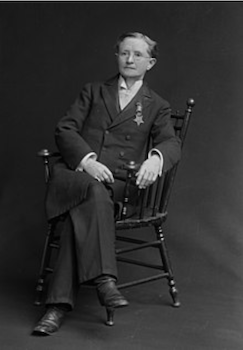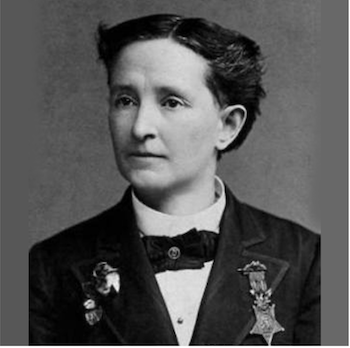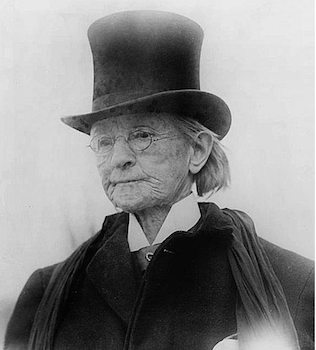
Born in New York on November 26, 1832, and the youngest of seven children, Mary Edwards Walker was raised in a nontraditional family with a significantly progressive mindset for the period. Both her parents insisted that she receive a well-rounded education and her mother, especially, constantly challenged the notions associated with the typical female gender role. From here, her independence as a free-thinker and intellectual grew, especially during her time at the first free school in Oswego, New York, founded by her very own parents who wanted her to have the same quality instruction as her brother. She continued her education at Falley Seminary, a preparatory school for young females, and she became a teacher in Minetto to save up enough money to pursue her dream of becoming a doctor. After years of devouring her father’s medical textbooks at home, she attended and graduated from Syracuse Honors Medical College, being the only woman in her class.
As she entered her twenties, Walker was exposed to a flurry of injustices that she faced with an indomitable spirit. Although she started a private physician practice alongside her husband (whom she subsequently divorced because of his infidelity), she was denied a position as a surgeon in the Army at the start of the American Civil War. This dismissal led her to contribute her invaluable skills to the Union Army as an unpaid, civilian volunteer; she was later offered a position as the first female surgeon in the U.S. Army Medical Department.

By 1864, leading up to the second year of the Civil War, she was arrested as a spy by Confederate troops directly following her honorable assistance in performing an amputation for the U.S.’s southern enemies. After being released during a prisoner exchange, she went on to be the Administrator and Chief Surgeon of the Female Military Prison Hospital in Kentucky and later Headmistress of a Tennessean orphanage. In her typical advocate fashion, she preached that “[letting] the generations know that women in uniform also guaranteed their freedom,” declaring the mark she wanted to leave behind with her actions.
In 1865, she was awarded the Medal of Honor despite never being formally recommended, which is given to those who have “distinguished [themselves] conspicuously by gallantry and intrepidity at the risk of [their] life above and beyond the call of duty,” according to the Navy and Marine Corps Awards Manual. In 1916, however, her well-earned award was revoked on account of her never having physically fought the enemy, disregarding the fact that she, unlike many men who were too fearful of being imprisoned, had repeatedly gone into rival territory to provide medical assistance. Fortunately, after almost half a century since she refused to surrender her medal (and unfortunately following her passing), her recognition was restored, albeit by a board below the Secretary of the Army: the Army Board for Correction of Military Records.

Another peculiarity about Mary Edwards Walker was her insistence on wearing odd, masculine attire, because as she recognized in her book, HIT: Essays on Women’s Rights, “the greatest sorrows from which women suffer today are those physical, moral, and mental ones, that are caused by their unhygienic manner of dressing!” (Walker, 1871). Often wearing men’s trousers, a top hat, and rarely seen in long skirts or petticoats, she defended her views by stating, “I don’t wear men’s clothes, I wear my own clothes.” The culmination of years of being mocked, disrespected, and often being the victim of egg attacks came in 1870 when Walker was arrested in New Orleans because of her manner of dressing.
Later becoming an author on health care, women’s rights, and female dress reform, she landed a key position at the Central Woman’s Suffrage Bureau in Washington. In 1871, when she attempted to register to vote and was rejected. As a result, she led a movement that fought for implementing constitutional amendment and even testified on women’s suffrage before the U.S. House of Representatives in 1912.
On February 21, 1919, with the end of World War I barely behind her, Walker died in New York at the age of 86 without having remarried or had children. Her efforts and those of countless others were not made in vain, as just a year after her death, the Nineteenth Amendment in the United States Constitution, which guarantees women’s right to vote, was ratified. Buried wearing a black suit instead of a dress, she established her place in American history and culture, again showing the world what it truly means to be a woman, activist, and everything in between.
Why Did I Choose to Research Mary Edwards Walker?
Throughout the AP World History: Modern course I took this year, the many gaps in the storyline of the globe left behind in my education were unavoidably filled with abundant knowledge–and, consequently, innumerable questions. A subject that I had barely touched before in my social studies classes was World War I, especially the societal changes and efforts that resulted from the empowerment seized by minorities because of it. After diving into many documentaries and books on suffrage movements and the masked heroes behind HIStory, in addition to some research on exemplary individuals, Dr. Mary Edwards Walker became and remains an inspiration to me and, through this article, hopefully, to countless others.
Works Cited
6 Mary Edwards Walker: Trailblazing feminist, surgeon, and war veteran. (n.d.). Retrieved June 18, 2022, from https://www.facs.org/-/media/files/archives/shg-poster/2016/06_walker.ashx?la=en
Dr. Mary Edwards Walker: Physician, Civil War surgeon, activist. (n.d.). Retrieved June 18, 2022, from https://www.alphaomegaalpha.org/wp-content/uploads/2021/03/19_Autumn_Editorial.pdf
Dr. Mary Walker: Fighting for work, fighting for women. (n.d.). Retrieved June 18, 2022, from https://www.mohhc.org/wp-content/uploads/2020/06/Chloe-Newman-Dr.-Mary-Walker-Essay.pdf
Google. (n.d.). Navy and Marine Corps Awards Manual Google Books. Retrieved June 18, 2022, from https://books.google.it/books?id=HgZ-AAAAIAAJ&lpg=PA6&ots=TDGC1mn1ty&dq=medal+of+honor+distinguished+himself+conspicuously+by+gallantry+and+intrepidity+at+the+risk+of+his+life+above+and+beyond+the+call+of+duty&pg=PA3#v=onepage&q&f=false
Mary Edwards Walker: Above and Beyond. (n.d.). Retrieved June 18, 2022, from https://digitalcommons.lsu.edu/cgi/viewcontent.cgi?article=2623&context=cwbr
This article was published on 2/14/24